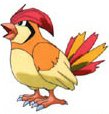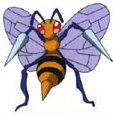 |
 Taking a Poke at PokémonBy John Gocke, video game reviewer for AlMenconi.comUsed with premission
Let's start with the basics from the world of the Pokémon. First of all, Pokémon is both singular and plural. There is no such thing as Pokémons. Whether you are talking about one or two Pokémon, it is still Pokémon! (It's like one or two moose not mooses.) Poke is acceptable on occasion, however. Don't ask me why! The object of the game is to capture or buy Pokémon and train them to obey and attack on command. Once they are ready, you can challenge other Pokémon Trainers. You do this until you have beaten all other local trainers and defeat the Elite 4 Trainers (who are "masters of evil," according to the official “Pokémon Handbook” by Maria Barbo.) The ultimate goal is to defeat the Pokémon Master and ascend to his throne (according to “Pokémon Pathways to Adventure” by Jason Rich). After that the final accomplishment is to capture and catalogue all the Pokémon in the world. Hence their slogan, "Gotta catch' 'em all" (or from the parents' point of view: "Gotta buy 'em all!") According to the official Pokémon Handbook, there are 150 different kinds of cute little stuffed pocket monsters (and the number is growing) who “love to fight” (ibid. pg. 6). When you have a maximum crew of six Pokémon trained, you are ready to challenge other trainers who also have six Pokémon ready to fight you (ibid. pg. 15). If you are skillful enough to win the fight, your team gets power-increasing experience points and the trainer (that's you) gets Poke cash or magic trinkets from the losing trainer. You use these spoils in upcoming fights, as they greatly enhance your chances of beating future challengers. All of the magic potions and trinkets are important for completing the quest of ascending to the status of Pokémon Master and "catching 'em all." As your cute little Pokémon gain experience points, they evolve into bigger and badder Pokémon. This evolving is almost Darwinian, as the critters get larger (some Pokémon grow from barely a foot high to more than seven feet tall and hundreds of pounds), often sprouting horns, fangs, and talons, as well as gaining supernatural powers. Their fighting ability evolves right along with their size. It truly is survival of the fittest in this dog-eat-dog (or should I say Pokémon-eat-Pokémon) world. Even when they are still cute, furry, and not yet evolved, Pokémon fight by biting and scratching their opponents. They may not be able to kill an opponent at this level, but they can sure hurt each other. As they morph, they become more deadly. Depending on their elemental (horoscope like) sign, they may fight by belching fire, psychic attacks, casting spells, spraying poison clouds, crushing moves and crippling mayhem. At this point, they begin to lose their cuteness. To be a winning trainer, you not only have to be a good fighter, but also a Pokémon scholar. You must memorize all the statistics of each pocket monster, in each of its different stages of development, plus know the magic and energy cards. Each Pokémon has a trading card that lists its name, Poke number, element (horoscope-like sign), number of damage points it can withstand, primary and secondary attack skills, the opponent which gives it the hardest fight, and what evolutionary stages it goes through. This involves learning dozens of statistics on hundreds of cards, and takes untold hours to master.
This game is mentally challenging and can definitely develop critical thinking skills in children. However, we have some serious concerns:
Pokémon has been banned on a number of school campuses because of its addicting influence on kids, as they become absorbed with playing and collecting. Games like this are designed to be addictive. They want kids to play and buy more Poke product to keep playing. The cute, colorful characters, the sensory stimulation of the cartoons and video games, the thrill of winning, the challenge of collecting and keeping all the Pokémon can lure some kids into a fantasy world they may not readily wish to leave. Many kids can enjoy these games as a healthy way to socialize with other children. Others, however, have addictive personalities, which make them more susceptible to these attractions. Parents need to watch their children at play and see if the game might be affecting their child adversely. CONCERN #2 As the characters evolve into larger and fiercer beasts, they develop such powers and weapons as cannons built into their bodies, spraying poison and toxic gas, electrocution, and even eating your dreams. In the world of Pokémon, children are taught that each Pokémon has a special gift or talent. However, instead of using those gifts to help others, children are being encouraged to fight each other. CONCERN #3 Channelers, like the Silph Scope, are real! Channelers are people who “channel” or become possessed with a spirit who communicates through the human host. This occult encounter, as well as others in the storyline ("Pathways to Adventure", pg. 70), are specifically targeted for a pre-teen audience. Pokémon can be a gateway and a simple stepping-stone to more overtly occult games like Dungeons & Dragons. While we recommend caution, parents don't need to panic. Although many kids are deeply invested in the hobby of collecting and playing Pokémon, they're not all lusting after bloody combat and magic powers. Most are simply attracted to the fantasy of the characters and the social aspect of trading with their friends. However, role-playing games, such as “Pokémon” and "Dungeons & Dragons", encourage children to identify with the personality of the character they play. A child who pretends to be a character that abuses animals and attacks people is more likely to find that type of behavior acceptable in real life. What we focus on makes a difference in how our children grow in character and spirit. "Whatever things are true, whatever things are noble, whatever things are just, whatever things are pure, whatever things are lovely, whatever things are of good report, if there is any virtue and if there is anything praiseworthy, let your mind dwell on these things." (Phil. 4:7-8) The ultimate solution is not an adrenaline-filled alternative to Pokémon combat, but in the ability to focus on a relationship with God. The practical thing to do is pray with your child, and spend time getting to know the games and entertainment that interests him. Ask your child if he really likes the idea of pets biting and scratching each other and being hurt. Ask him if using magic against other people is what God would want them to do (Is. 2:6, Ez. 13:20). The Bible has a lot to say about how we should treat our neighbors, and how to be good stewards of the animals God has given us (Lev. 19:18, Mt. 22:39, Gen. 1:28-31). Let us pray that we will become godly parents and leaders who will be able to guide our children into the reality of living in the light of the Word. Let us also pray for spiritual direction for all the programmers, designers, and marketers of video games to be led by the Holy Spirit, instead of the spirit of darkness.
Pokémon can be a bad thing and has somethings in it that need to be monitored with any child, but it is only one part of a much larger threat. Everything in pokemon are characteristics of the type of cartoon pokemon is, which is anime. Anime stands for Japanese animation, and while pokemon needs to have caution used with it, other anime need to be avioded and stopped. For more information on the incredible threat that is sweeping the nation called anime, visit this website:
http://crossofgold01.tripod.com/caai/ My Ratings: [3/4]
—Turtlemaster01, age 15 Neutral—Yo, TurtleMaster. Some anime might be bad, but others are dubbed and “Americanized.” These include Dragon Ball Z (Funimation), Sailor Moon and Sailor Moon R (DiC), Sailor Moon S and Super S (Cloverway), and Cardcaptors (Nelvana). … Pokémon is a good anime that teaches kids friendship, and perseverence, among other things. My Ratings: [5/5] Pokémon is wrongly judged. I have been playing it since it came out. There is nothing occultic about it. The violence is mild. I play the video game. My friend is into Pokémon TCG (trading card game). There is one time I can recall that a teenager offered him a “magic the gathering” pack, he simply shrugged it off and told him he wasn't into that game. In the game though “magic potions” are not magic. They are just simple medicines and antidotes that you would give to an animal. The pokemon don't even die they just faint. Many teachers think the game teaches students about cooperation through trading that takes place in the game. Also they have an article at famly.org--plugged in magazine and it supports pokemon. My Ratings: [4/5] Disclaimer: The opinions expressed in this Christian Spotlight review are those of the reviewer (both ratings and recommendations), and do not necessarily reflect the opinions of Films for Christ or the Christian Answers Network.
Christian Spotlight Guide2Games is part of Christian Answers. Copyright © Films for Christ. • “Christian Spotlight’s Guide to Games” and “Guide2Games” are service marks of Films for Christ.  |


